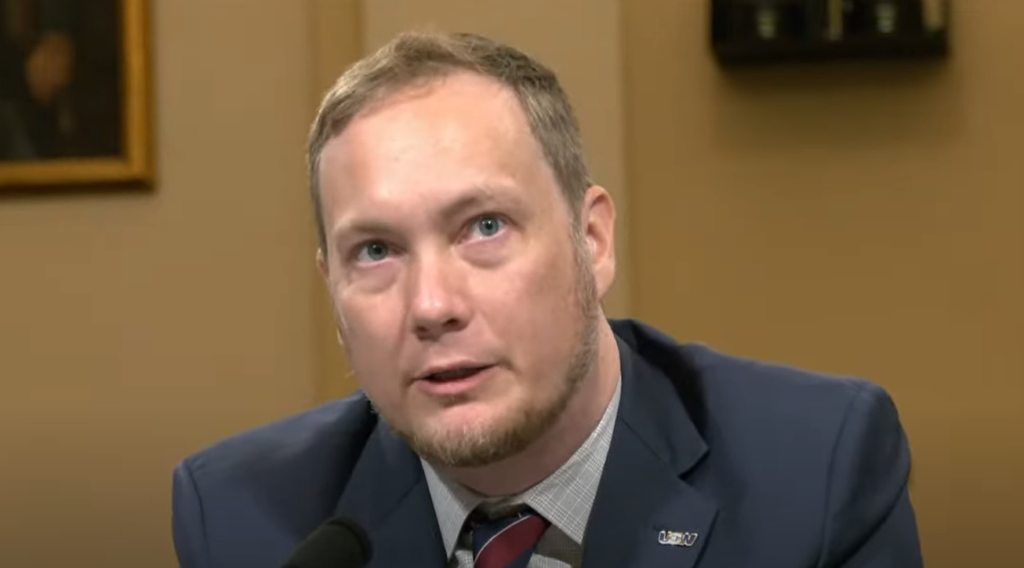District 4 Member Testifies on Forced Labor in China for Senate Finance Committee
On March 18, 2020 District 4 member Joe Wrona from Local Union 135L testified for the Committee on Finance hearing on “Fighting Forced Labor: Closing Loopholes and Improving Customs Enforcement to Mandate Clean Supply Chains and Protect Workers.”
You can read his full testimony below or click here to download it as a PDF.
Chairman Wyden, ranking member Crapo, members of the committee, my name is Joe Wrona and I am a member of the United Steelworkers and a maintenance mechanic at the Sumitomo tire plant in Tonawanda, New York. Thank you for the opportunity to testify today on the important topic of how to fight forced labor and improve our supply chains.
Connecting my life in Buffalo to global supply chains and forced labor is unfortunately and surprisingly too straightforward. While I’ve worked at the tire plant for the last couple years, my previous job was at Ferroglobe’s Niagara Falls, New York plant. I worked there for ten years, with roughly 100 other union members and management. The Ferroglobe facility, which I’ll call Globe, used to produce metal silicate by taking quartz, woodchips, and coal and cooking them in an electric arc furnace until the quartz is reduced into silicon metal.
Metal silicate is a product that we made twenty-four/seven at the plant. It is a product you interact with every day in a variety of ways. From strengthening Aluminum, to the caulking that seals your home, or even cosmetics – silicon metal is everywhere. It is also a base component to the production of polysilicon which is vital to solar panel production.
Expecting that strong demand for solar power would boost metal silicate demand, in 2009 Globe planned a $35 million upgrade to convert its metallurgical grade silicon into 4,000 tons of upgraded metallurgical grade silicon each year – enough to produce 500 Megawatts of solar power. Our company in an investor report from 2016 highlighted the opportunity to see demand grow as SolarCity, a solar panel company connected to Elon Musk, was supposedly in the final stages of construction. However, that vision fell apart for the workers at Globe in 2018 when the plant was closed because of a lack of demand.
Globe has been fighting illegal trade practices in metal silicate for decades now. The first trade enforcement case against dumped and subsidized metal silicate from China started thirty years ago in 1991. But while tariffs on metal silicate helped to defend our jobs at Globe, they could not stop products farther up the supply chain like solar panels or those produced with forced labor.
The growth of China’s industrial capacity is well documented. Chinese companies in polysilicon produced over 80 percent of global polysilicon in 2020. This has effectively locked the U.S. out of growing solar demand and the overcapacity in China destroys nearly any ability of U.S. companies to compete.
But for my brothers and sisters who made good wages at Globe between $70,000 and $100,000 dollars a year — were victims not only of unfair trade practices but also forced labor in China. About 45% of the world’s supply of solar-grade polysilicon comes from Xinjiang. The news about human rights abuses there are unacceptable. According to academic experts – ten million Muslim minorities in the region are under lock-down control, and over one million Uyghurs and others have allegedly disappeared into internment camps. One study estimates that more than 80,000 Uyghurs were transferred out of Xinjiang to work in factories across China between 2017 and 2019.
There should be no debate. Eliminating Forced Labor from our country’s supply chain should happen today and companies who have benefited should be held accountable. It was a good step when Customs and Border Patrol issued a Withhold Release Order against cotton and tomato products produced by Uyghurs. We should act immediately to do the same for products like solar panels that contaminate the supply chain with forced labor.
We also need to act urgently to defend American workers and foster a domestic solar industry here. This means direct investment in metal silicate plants like my old facility in Niagara Falls or the plant in Alloy, West Virginia where my union brothers and sisters work.
Thank you for the opportunity to testify today and I look forward to answering any questions you may have. Finally, working with my union, I’ve included additional materials with my written testimony.
Additional supporting materials related to Fighting Forced Labor: Closing Loopholes and Improving Customs Enforcement to Mandate Clean Supply Chains and Protect Worker
AFL-CIO statements regarding Forced Labor in the Xinjiang Uyghurs Autonomous Region, China.
- https://aflcio.org/about/leadership/statements/ending-forced-labor-xinjiang-uighur-autonomous-region-china
- https://aflcio.org/press/releases/progress-long-awaited-ban-certain-products-uyghur-region-china
- https://aflcio.org/press/releases/afl-cio-applauds-action-ban-goods-made-forced-labor-linked-xinjiang-production-and
Council on Foreign Relations article.
By clicking Sign Up you're confirming that you agree with our Terms and Conditions.
Recent News Articles
Want to Learn More?
See how the USW is making a real difference in our communities and our workplaces.

